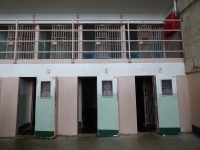Buy More Beds and Build More Prisons!

Prison overcrowding is an issue the NSW Government can no longer ignore.
Our State holds over 12,000 inmates—a record high—and the latest figures released by the Bureau of Crime Statistics and Research (BOCSAR) on Friday suggest this number will continue to rise. The number of convicted inmates rose by nine per cent in the past year, while the number of people on remand (awaiting their court dates behind bars) increased by a whopping 17 per cent.
It is important to note that the 3800 inmates currently on remand in NSW have not been convicted of any crime – they are awaiting trial and a significant proportion will have their cases withdrawn by the prosecution or thrown out of court. Many are victims of amendments to the new Bail Act, which have resulted in those accused of certain serious offences being locked away despite minimal evidence against them.
With prisons exceeding capacity and more inmates on the way, the NSW Government has responded by providing funding for more beds. NSW Corrections Minister, David Elliott, announced the strategy, which includes expanding the Parklea Correctional Centre and building a new prison in Grafton.
“We have introduced 1985 beds since March 2014, including 430 beds recently introduced to help ease immediate pressure on the system,” he said.
While prison overcrowding draws little sympathy from the public, there are serious consequences for inmates and society. Apart from the obvious concerns, such as the physical and mental health of inmates, overcrowding increases friction amongst inmates, and between inmates and prison staff, and places strain on the ability to protect the safety and well-being of those within prisons.
Health Concerns
As well as concerns about sanitation, nutrition, communicable diseases, and the management of inmate violence, there is the ever-present issue of inmates’ mental health – which can be adversely affected when prisons are understaffed and overpopulated.
In his 2014 annual report, Nick Hardwick, Chief Inspector of Prisons in England and Wales, singled out suicide as the “most unacceptable feature” of overcrowding, understaffing, and lack of safety within prisons.
Mr Hardwick made this statement in response to a 69 per cent increase in suicides during in the 2013-14 financial year— when an average of over 7 prison suicides occurred each month.
Human Rights Concerns
An interesting example of how overcrowded prisons can result in human rights violations occurred when overflowing Victorian prisons caused problems for the Melbourne Magistrates Court in 2013.
During that year, up to a third of inmates were simply not transported to court due to logistical problems caused by overcrowding. The delays cost the community tens of thousands of dollars in additional costs.
As well the financial burden, the right to apply for release and to a fair hearing were being denied because prisons administrators failed to transport inmates to court for important appearances including bail applications and contested hearings.
Dr Gideon Boas, an Associate Professor in the Monash Law Faculty, reported in the The Castan Centre for Human Rights Law’s 2015 report that,
“In late October 2013, following weeks of case delays and adjournments, Magistrate Michelle Ehrlich described the effects of the crisis as beyond her level of tolerance.”
Her Honour considered charging the Governor of the Metropolitan Remand Centre with contempt of court under Section 133 of the Magistrates’ Court Act for disobeying an order directing him to produce a witness (the defendant).
Dr Boas says that while charging a prison governor may sound drastic, it could cause the Department to ‘pull up its socks’ and abide by court orders, thereby upholding inmates’ rights.
Other Options
As well as producing unsatisfactory outcomes for inmates and society, overcrowded prisons signal problems with the way we deal with crime generally. As there has not been a corresponding increase in crime rates, there are growing calls for a review of policy regarding sentencing and tough bail laws.
Christine Wheeler QC, a former Justice of the Supreme Court of WA, told the ABC’s 7:30 program that the Australian criminal justice system relies too heavily on prison sentences.
“My concern about prison as a tool generally is that it doesn’t do what it’s supposed to do, or it doesn’t do it well, or it does it at huge cost”, she said.
“We assume it deters people from crimes – that is, that people think, ‘I better not commit this crime because I might get three years.’”
“Deterrence works for people like you and me, who think about consequences and would not commit the offences anyway. It doesn’t work for drug addicts, it doesn’t work for alcoholics, it doesn’t work for people who are mentally ill.”
Penal Justice International has developed a plan which seeks to provide guidance to policy-makers around the world about how to tackle prison overcrowding and its harmful consequences. Its suggestions include:
- investing in non-custodial alternatives to detention both pre-trial and post sentencing,
- diverting minor cases out of the criminal justice system altogether,
- investing in long-term strategies for crime prevention and reduction,
- reducing high rates of pre-trial detention by improving access to justice, and
- making special or alternative arrangements for vulnerable groups, such as children, mothers with dependent children and people with mental health issues.
BOCSAR Director, Dr Weatherburn, says the Bureau is looking at the current causes of growth in prison numbers, and that a report should be available next month.
However, with a State government intent on locking more people up for longer, some feel that sensible reports by experts will only fall on deaf ears.
Receive all of our articles weekly
Author






